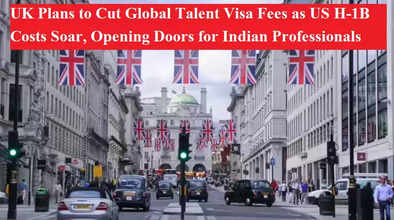UK Plans to Cut Global Talent Visa Fees as US H-1B Costs Soar, Opening Doors for Indian Professionals

The United Kingdom is gearing up to attract highly skilled professionals from around the world by considering major changes to its Global Talent Visa program. With the United States raising its H-1B visa application fee to a staggering $100,000 (around ₹88 lakh), countries like China and the UK are preparing to step in and welcome the talent that might now turn away from America.
UK’s Strategic Move to Attract Global Talent
According to a report published in Financial Times, British Prime Minister Keir Starmer is exploring the idea of waiving or significantly reducing visa fees for scientists, academicians, digital experts, and other highly skilled professionals. This initiative comes as part of his government’s push to accelerate economic growth and innovation by bringing in world-class talent.
Currently, the UK’s Global Talent Visa is already a popular route for professionals in science, engineering, medicine, humanities, arts, and digital technology. However, high costs have often been a barrier for applicants. By lowering or even eliminating fees for select candidates, Britain hopes to outshine the U.S. and other competitors in the global race for talent.
Who Will Benefit from the Policy?
Reports suggest that the new policy discussions include the possibility of waiving fees for individuals with extraordinary credentials, such as graduates from the world’s top five universities or winners of prestigious international awards.
An official quoted in the report stated, “We are focusing on individuals who have studied at the world’s top institutions or earned globally recognized honors. The idea is to reduce the cost burden to zero for such exceptional candidates.”
This selective fee waiver is aimed at ensuring the UK remains a hub for cutting-edge research, innovation, and entrepreneurship while taking advantage of uncertainties in the U.S. immigration system.
Current Fee Structure for the UK Global Talent Visa
At present, the Global Talent Visa costs £766 (around ₹91,000) per applicant. The same fee applies to dependents, including partners and children. Additionally, applicants must pay an annual health surcharge of £1,035 (around ₹1.23 lakh).
The program was first launched in 2020 to invite leaders and emerging leaders across STEM fields, arts, culture, and digital technology. It was designed to make the UK a preferred destination for high-caliber professionals, but the relatively high fees have often made applicants think twice.
Why This Move Matters Now
The timing of this proposal is crucial. With the U.S. introducing unprecedented H-1B visa fees, many companies may hesitate to hire foreign talent under such costly terms. For Indian IT professionals, engineers, and researchers who have long relied on the H-1B pathway to the U.S., the UK could emerge as a more attractive alternative.
Meanwhile, China has also announced the launch of a new K Visa targeting STEM experts, further intensifying global competition for skilled workers. The UK, by easing financial barriers, aims to position itself as a frontrunner in this race.
Outlook for Indian Professionals
For Indian engineers, tech experts, healthcare specialists, and researchers, Britain’s move could open new doors. Many professionals who previously looked exclusively to the U.S. for opportunities may now seriously consider the UK.
The potential removal of visa fees—especially for candidates from top universities and high achievers—will not only make migration more affordable but also enhance the UK’s reputation as a destination that values talent over financial capability.
Conclusion
As the U.S. makes its visa process costlier, Britain is working on a strategy to attract the best and brightest minds without financial hurdles. If implemented, the new Global Talent Visa policy could reshape global migration trends, giving Indian professionals and other skilled workers a golden opportunity to build careers in the UK.
With global competition for talent heating up, Britain’s decision may prove to be a game-changer in the international job market.

